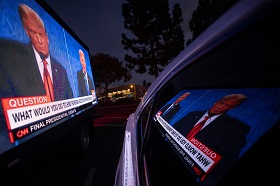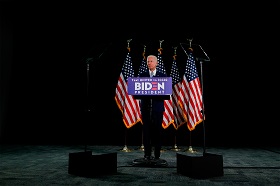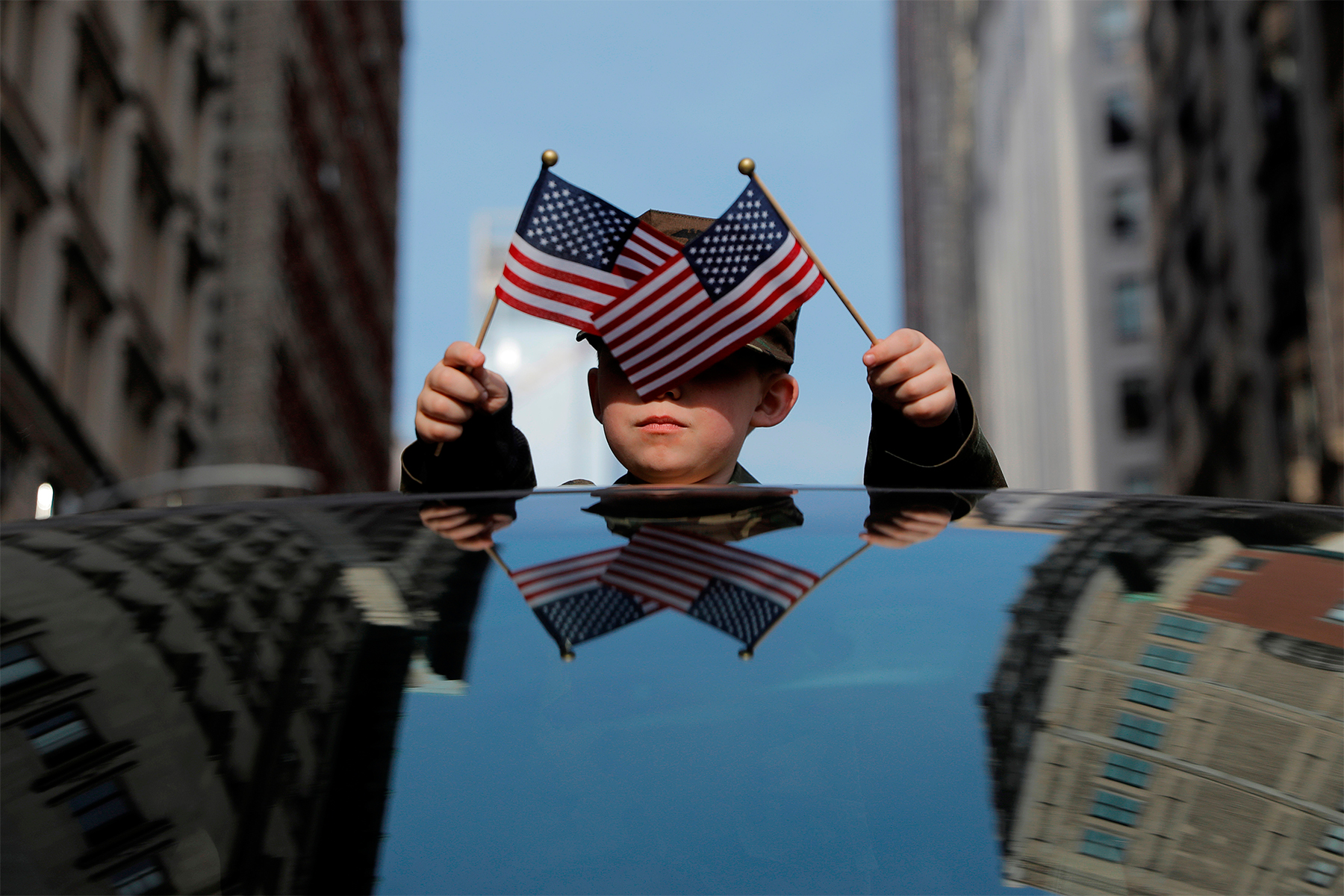The U.S. presidential election is in its final stretch with only a few days left until American voters decide who and what will map out their destiny for the next four years. Just as it was in 2016, Russia is a topic at the forefront of conversations swirling around this year's election. There have been overly broad discussions about foreign policy during this campaign cycle, but where does each candidate stand when it comes to Russia? And what would relations look like under the various candidates?
In this year's political saga, there are only four candidates who will be on the ballot in at least 45 states — which means only four candidates have a viable route to the highly coveted 270 delegates needed to become commander-in-chief of the United States. Here's a summary of where those candidates stand on Russia based on what they've said, what they've done, and what they say they're going to do.
Everyone knows who the heavyweights are in this year’s election, but very little attention has been paid to third-party candidates like Jo Jorgensen who actually represent millions of voters across the United States and who could likely sway the outcome on November 3.
The Clemson University professor turned Libertarian presidential candidate is bringing perhaps the most unique set of policy ideas to this year’s election. Among those ideas, is a proposal to transition the United States to a non-interventionist, Switzerland-like foreign policy that is “armed and neutral.” Jorgensen staunchly opposes the status quo of endless wars and rampant interventionism, arguing that such policies have wasted trillions of dollars, caused unnecessary suffering, and ultimately make Americans less safe. As president, Jorgensen has promised to end Washington’s involvement in foreign wars, bring more than 200,000 soldiers stationed in foreign countries back home, and end the practice of subsidizing other countries vis-à-vis military aid.
The self-described “original Green New Dealer,” Howie Hawkins, is another third-party candidate who has flown under the radar of pop-political culture but who is nonetheless a viable candidate with his name on the ballot in 45 states. Naturally, as the crowned champion of the Green Party, Hawkins is running on a platform that is eco-focused and eco-friendly. That, however, is not all the former Teamster has to offer.
Former Vice President Joe Biden is a man who needs no introduction. As someone who has been in the political limelight ever since limelights were invented, Biden has long developed and made known his views on Russia.
At the beginning of the Obama administration, Biden was a strong proponent of forging a fresh start with Russia that would focus on mutual interests like nuclear arms control, nonproliferation, stabilizing Afghanistan, fighting terrorism, opening global markets, and a range of other issues. That temporary partnership took a turn for the worse in 2014 following Crimea's reunification with Russia and Russia's intervention in Syria that thwarted the Obama administration's efforts to enact regime change. Since then, Biden has advocated an adversarial foreign policy towards Russia. He has been in favour of increased sanctions, arming Ukraine, pushing back on the Nord Stream 2 pipeline, and hitting Russia with cyberattacks.
The U.S. presidential election is in its final stretch with only a few days left until American voters decide who and what will map out their destiny for the next four years. Just as it was in 2016, Russia is a topic at the forefront of conversations swirling around this year's election. There have been overly broad discussions about foreign policy during this campaign cycle, but where does each candidate stand when it comes to Russia? And what would relations look like under the various candidates?
In this year's political saga, there are only four candidates who will be on the ballot in at least 45 states — which means only four candidates have a viable route to the highly coveted 270 delegates needed to become commander-in-chief of the United States. Here's a summary of where those candidates stand on Russia based on what they've said, what they've done, and what they say they're going to do.
Jo Jorgensen
Everyone knows who the heavyweights are in this year’s election, but very little attention has been paid to third-party candidates like Jo Jorgensen who actually represent millions of voters across the United States and who could likely sway the outcome on November 3.
The Clemson University professor turned Libertarian presidential candidate is bringing perhaps the most unique set of policy ideas to this year’s election. Among those ideas, is a proposal to transition the United States to a non-interventionist, Switzerland-like foreign policy that is “armed and neutral.” Jorgensen staunchly opposes the status quo of endless wars and rampant interventionism, arguing that such policies have wasted trillions of dollars, caused unnecessary suffering, and ultimately make Americans less safe. As president, Jorgensen has promised to end Washington’s involvement in foreign wars, bring more than 200,000 soldiers stationed in foreign countries back home, and end the practice of subsidizing other countries vis-à-vis military aid.
Although unlikely, given the duopolistic nature of the American political system, a Jorgensen presidency would likely lead to a peaceful co-existence with Russia by de-escalating the United States’ involvement in countries like Ukraine and Syria. Based on her commitment to ending embargos, the American sanctions that unjustly target Crimea, hinder the reconstruction process in Syria, and are currently derailing the Nordstream 2 Pipeline would likely be lifted. It's not clear where Jorgensen stands on the New START Treaty, but it's reasonable to assume that she would likely support extending the agreement and co-signing additional agreements that promote peace between the United States and Russia.
Howie Hawkins
The self-described “original Green New Dealer,” Howie Hawkins, is another third-party candidate who has flown under the radar of pop-political culture but who is nonetheless a viable candidate with his name on the ballot in 45 states. Naturally, as the crowned champion of the Green Party, Hawkins is running on a platform that is eco-focused and eco-friendly. That, however, is not all the former Teamster has to offer.
Mixed into Hawkins’ ecosocialist vision for the United States, is a commitment to what his campaign calls “peace policies,” which include cutting the military budget by 75%, unilaterally disarming America’s stockpile of nuclear weapons to a minimum credible deterrent, and ending decades of forever war.
Hawkins’ devotion to peace translates into a rather sober approach towards Russia. He is calling for a cybersecurity treaty with Russia and argues that Americans should reject the unhealthy obsession with Russiagate that has been used and abused to wage a new Cold War. Under a Hawkins’ presidency, one could expect a new era of diplomacy with the Kremlin aimed at lowering the risk of nuclear war. There are also reasons to believe that a Hawkins/Walker administration would end the sanctionary warfare against Russia, based on the fact that Hawkins has written about the devastating impact of sanctions in other contexts.
Like Jo Jorgensen, Howie Hawkins is very unlikely to emerge victorious on November 3. Nevertheless, both candidates represent sensible approaches towards Russia and prove that an appetite for better Russia-U.S. relations exists within the American electorate. The question is: will that appetite grow in the next four years?
Joe Biden
Former Vice President Joe Biden is a man who needs no introduction. As someone who has been in the political limelight ever since limelights were invented, Biden has long developed and made known his views on Russia.
At the beginning of the Obama administration, Biden was a strong proponent of forging a fresh start with Russia that would focus on mutual interests like nuclear arms control, nonproliferation, stabilizing Afghanistan, fighting terrorism, opening global markets, and a range of other issues. That temporary partnership took a turn for the worse in 2014 following Crimea's reunification with Russia and Russia's intervention in Syria that thwarted the Obama administration's efforts to enact regime change. Since then, Biden has advocated an adversarial foreign policy towards Russia. He has been in favour of increased sanctions, arming Ukraine, pushing back on the Nord Stream 2 pipeline, and hitting Russia with cyberattacks.
By every indication, a Joe Biden presidency would look a lot like the Obama presidency during its second term. And although it’s true that Biden has a reputation for bringing a sort of charm when it comes to building relations with other countries, it’s unlikely that he’ll carry with him that charm to build better relations with Russia beyond extending the New START Treaty. Biden is the most likely candidate to unseat Donald Trump, which means that Russia-U.S. relations are likely to continue being hostile, confrontational, and counterproductive.
Donald Trump
America's reigning champion and current president is quite possibly the hardest candidate to read into when it comes to his feelings towards Russia. While it's true that Donald Trump has said complimentary things about President Putin and is regularly accused by conspiracy theorists and political opponents of possessing a bred-in-the-bone affinity towards Russia, his deeds don't actually line up very well with the flowery language he uses to talk about relations with the United States' historic rival. In fact, if you take a moment just to ignore the flattering rhetoric and concentrate on Trump's actions through his first term, then you end up with an incredibly different picture than what is often portrayed in American media.
Trump, since taking office in 2017, has levied hundreds of new sanctions against Russia — oftentimes without a real clear rationale for doing so. He has forcefully lobbied against Gazprom’s Nord Stream pipeline connecting Russia to Germany through the Baltic Sea. He has led regime change efforts in Venezuela, a country where Russia has billions of dollars invested in contracts with the Maduro-led government. Trump has likewise pulled out of treaties like the Intermediate Nuclear Forces (INF) treaty and the Iran nuclear deal (JCPOA) against Russia’s wishes. He’s armed Ukraine with lethal weapons and his administration has tried to subvert any prospects of peace in the Donbas region. Trump has continued the United States’ illegal occupation in Syria and even authorized a military strike that killed dozens of Russian contractors, all of which have undermined Russia’s quest to restore stability to its most valuable ally in the Middle East.
With this laundry list of transgressions, it’s hard to imagine that Trump does the bidding of the Kremlin or Vladimir Putin. It’s even harder to imagine that President Trump sincerely holds an affinity towards Russia and that improving relations with Russia is a matter of top priority for him. It’s true, he often commends and expresses a willingness to pursue dialogue — however those sweet words rarely if ever translate into actions that Russians could genuinely perceive as being friendly. True to his days as a reality television star — Trump is unpredictable and keeps his audience at the edge of their seats.
Donald Trump, in that sense, is like a box of chocolates, you never know what you’re going to get. However, it’s unlikely that another term with Trump as president will bring about any improvements in Russia-U.S. relations.







